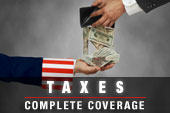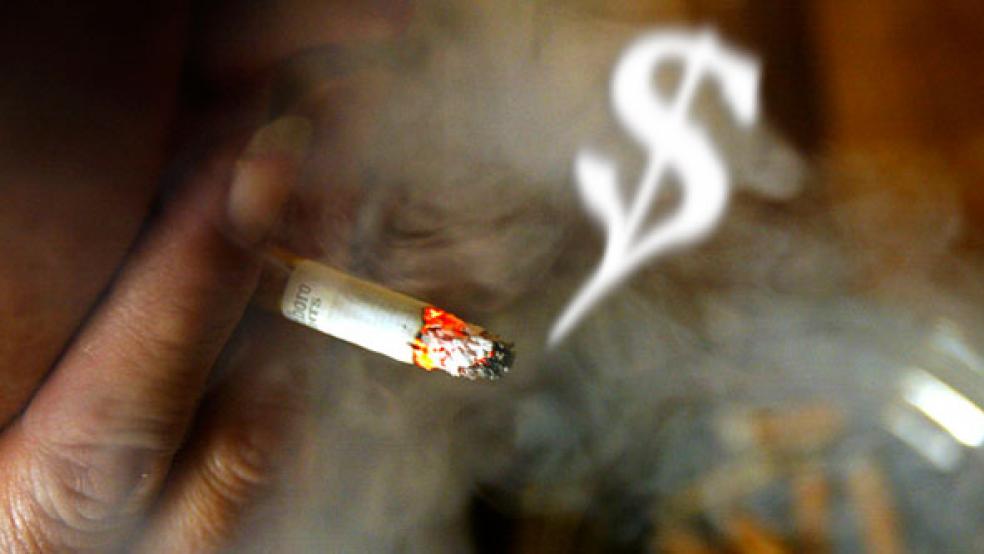The number of states hiking cigarette taxes to raise revenue while curbing smoking has slowed to a crawl.
Just one state, Illinois, has enacted a tobacco tax increase in 2012. That’s down from three in 2011 and an average of about ten a year for most of the past decade, according to the Campaign for Tobacco-Free Kids, a Washington, D.C.-based lobbying group.

And the lobbying landscape for anti-smoking activists pushing states to raise tobacco taxes just became more difficult. Late last month, the federal government warned local communities that they are prohibited from using federal prevention grants to push for ordinances that promote public health, which includes smoking restriction laws and cigarette tax increases – the cornerstones of most states’ smoking prevention strategy. Numerous states have been cutting back programs that help people quit smoking.
Inspector General Daniel Levinson at the Health and Human Services Department issued the warning to the Centers for Disease Control and Prevention, which has doled out $403 million for anti-smoking and anti-obesity “Communities Putting Prevention to Work” grants to 60 state and local government agencies and non-profit groups. Authorization for the spending was included in the 2009 stimulus act and the 2010 health care reform law. Smoking and obesity are the two biggest behavioral factors driving rising health care costs.
There may be “inappropriate lobbying activities” by groups that received the grants, Levinson wrote to Thomas Friedan, director of CDC. Federal law prohibits grantees from using money to lobby, whether at the federal, state or local level, Levinson warned.
The grants included $7 million to Jefferson County, Alabama for activities like promoting “the passage of a tobacco excise tax by the Alabama state legislature”; $1 million to Delaware’s governor’s office for anti-smoking work that included seeking “sponsorship of a bill that increases excise tax on other tobacco products”; and $560,000 to Nevada’s Department of Health and Human Services for working toward higher tobacco taxes.
The HHS investigator initiated the review after receiving complaints from Rep. Ed Whitfield and Rep. Brett Guthrie, Republicans from Kentucky, a leading tobacco production state. Whitfield, in his ninth term, reports having received over $90,000 in campaign funds from Altria, which owns Philip Morris.
The two Kentucky Congressmen demanded the investigation last March after Secretary Kathleen Sebelius told the House Energy and Commerce committee that lobbying restrictions on the grantees only applied to efforts to influence federal legislation, not state and local ordinances. The inspector general rejected that interpretation. “Our review . . . indicated that (inappropriate spending) may have originated from a lack of clear guidance – or even conflicting information – from CDC to (Communities Putting Prevention to Work) grantees concerning the anti-lobbying restrictions,” Levinson said.
The HHS investigators are also looking into state and local efforts to pass soda taxes or restrict sugar-drink cup sizes, such as the initiative recently undertaken by Mayor Michael Bloomberg in New York. “OIG plans to review CDC grants to reduce chronic disease and promote healthy lifestyles,” the warning letter said.
They should have little problem turning up examples of inappropriate activity there, too. The $10.4 million CDC grant performance report by the city of Philadelphia for obesity prevention work noted that its “campaign for a two cent per ounce tax on sugar-sweetened beverages . . . came up one vote short in the City Council.”
The City of Chicago, which received an $11.5 million prevention grant, used some of its money to “urge the General Assembly to adopt legislation that would increase the cigarette tax by $1 per pack.” Anti-smoking activists cheered passage of the tax hike during the spring session of the legislature.
“When prices go up and funding for prevention programs go up, smoking goes down,” said Vince Willmore, a spokesman for the Campaign for Tobacco-Free Kids. “Unfortunately, the rate of enacting cigarette tax increases has fallen off in recent years.”
The federal government raised cigarette taxes in 2009 by 62 cents to $1.01 a pack. State cigarette taxes range from a high of $4.35 a pack in New York to 17 cents a pack in Missouri, with the national average standing at $1.46 a pack.
There is a direct correlation between cigarette price hikes and consumption. A ten percent increase in price reduces consumption by about seven percent in teenagers and four percent in adults, research shows.
However, the tobacco industry has been undermining the anti-smoking effect of tax increases by discounting the price of its product. The result is that state and federal cigarette tax increases are generating more revenue and less smoking reduction than expected.
Still, the nationwide reduction in smoking over the past two decades represents a major triumph for public health advocates, who in addition to higher taxes have pushed laws to restrict smoking in public places, including the workplace, and funding for individual anti-smoking counseling and drugs. Adult smoking has dropped from 25.7 percent of the population in 1991 to 19.3 percent in 2010. Just 18.1 percent of high school students smoked in 2011, down from 36.4 percent in 1997.





